Logistics Planner Resume Examples

Mar 21, 2025
|
12 min read
Navigate the job market and land your ideal role with an effective logistics planner resume. Showcase your skills, experience, and unique value while steering your career path towards success. Make your application impossible to bypass!
Rated by 348 people
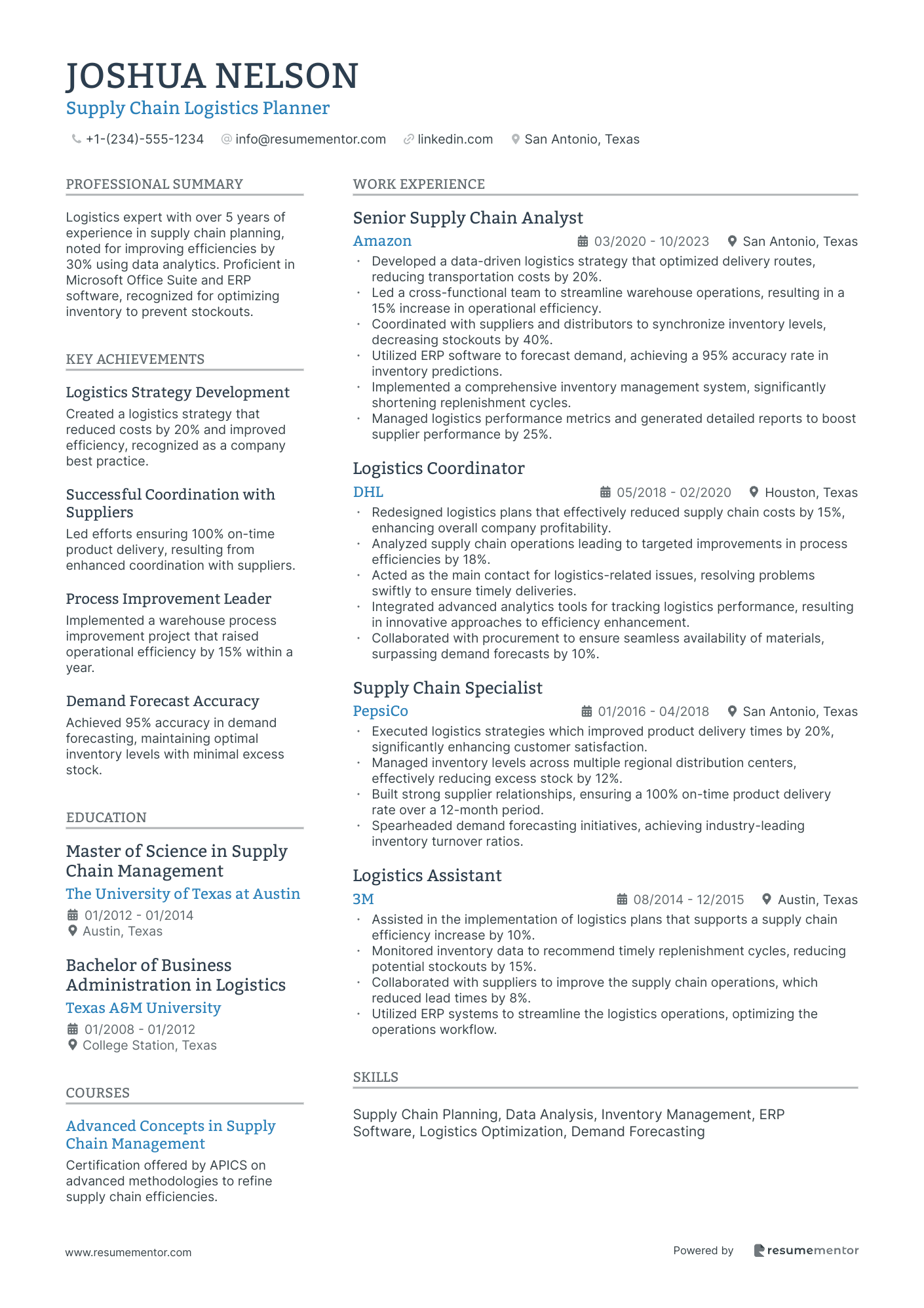
Supply Chain Logistics Planner
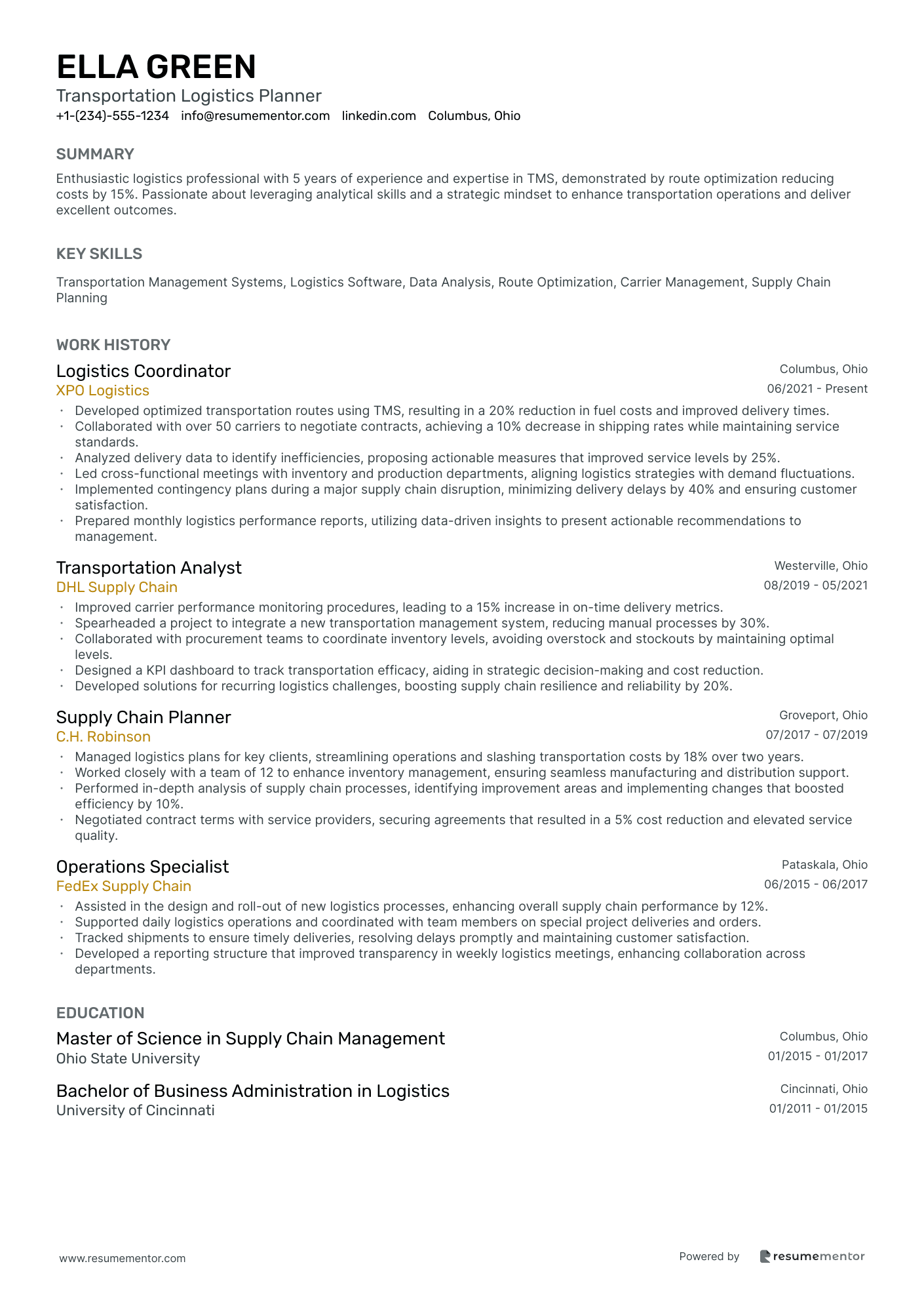
Transportation Logistics Planner
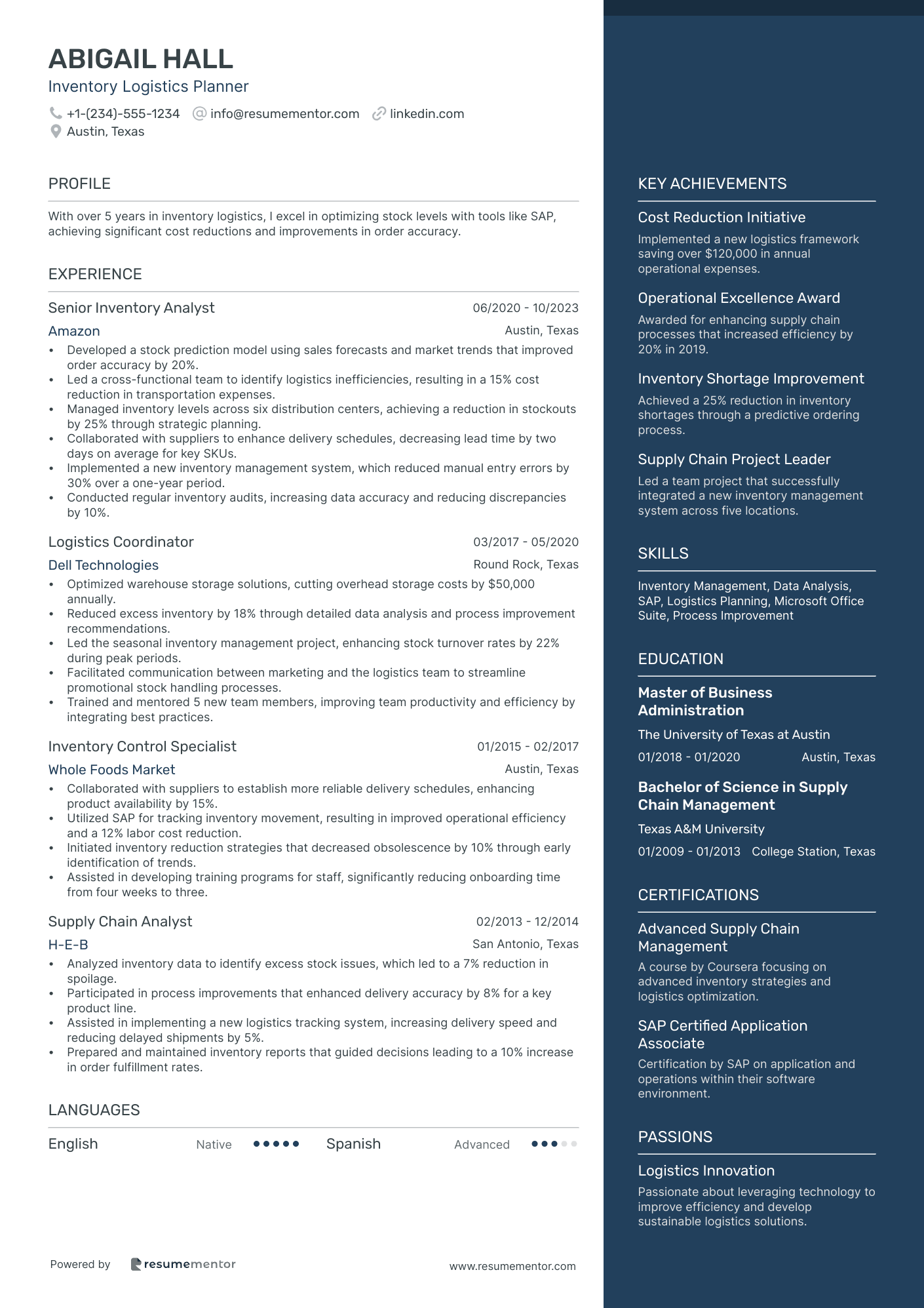
Inventory Logistics Planner
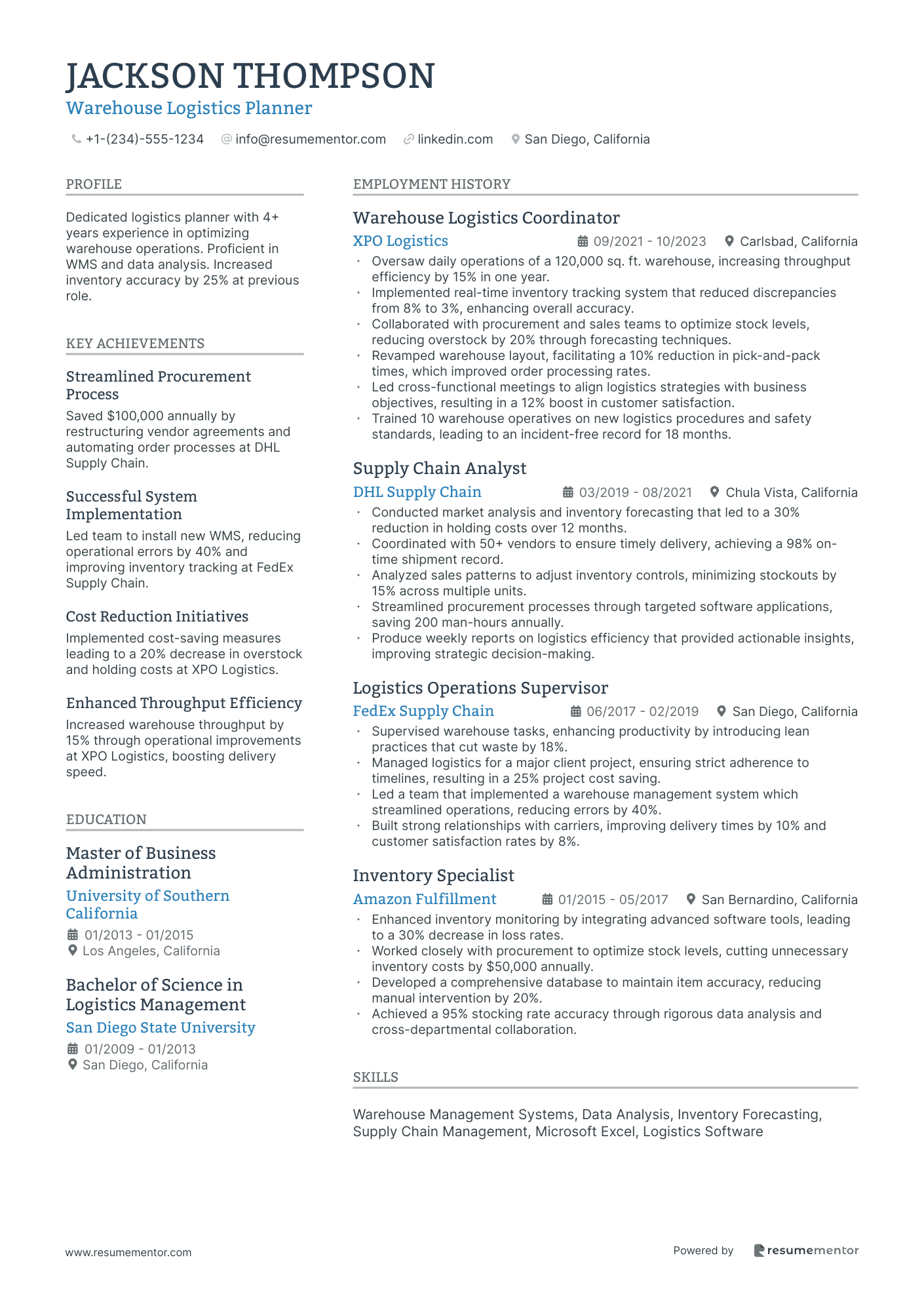
Warehouse Logistics Planner
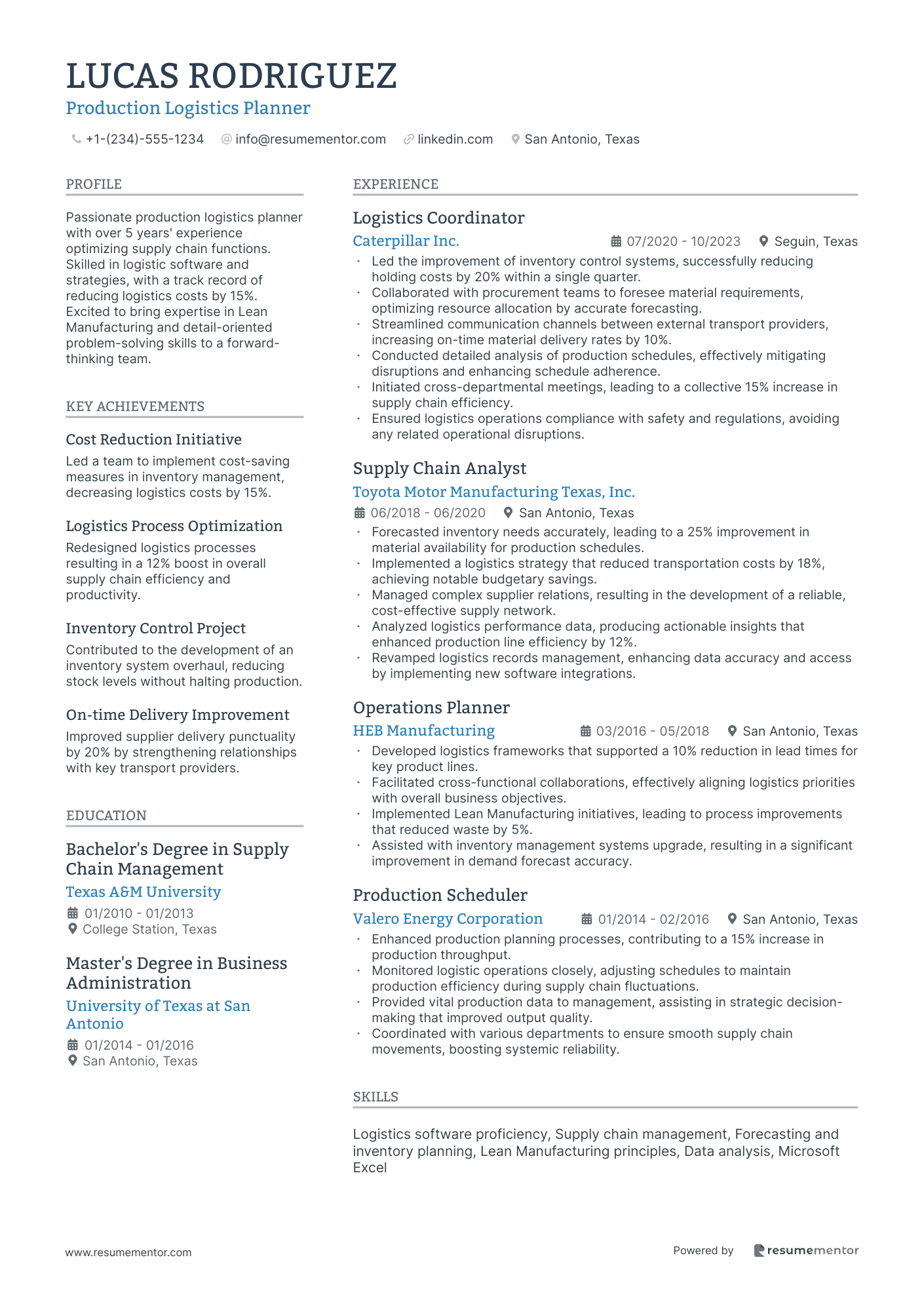
Production Logistics Planner
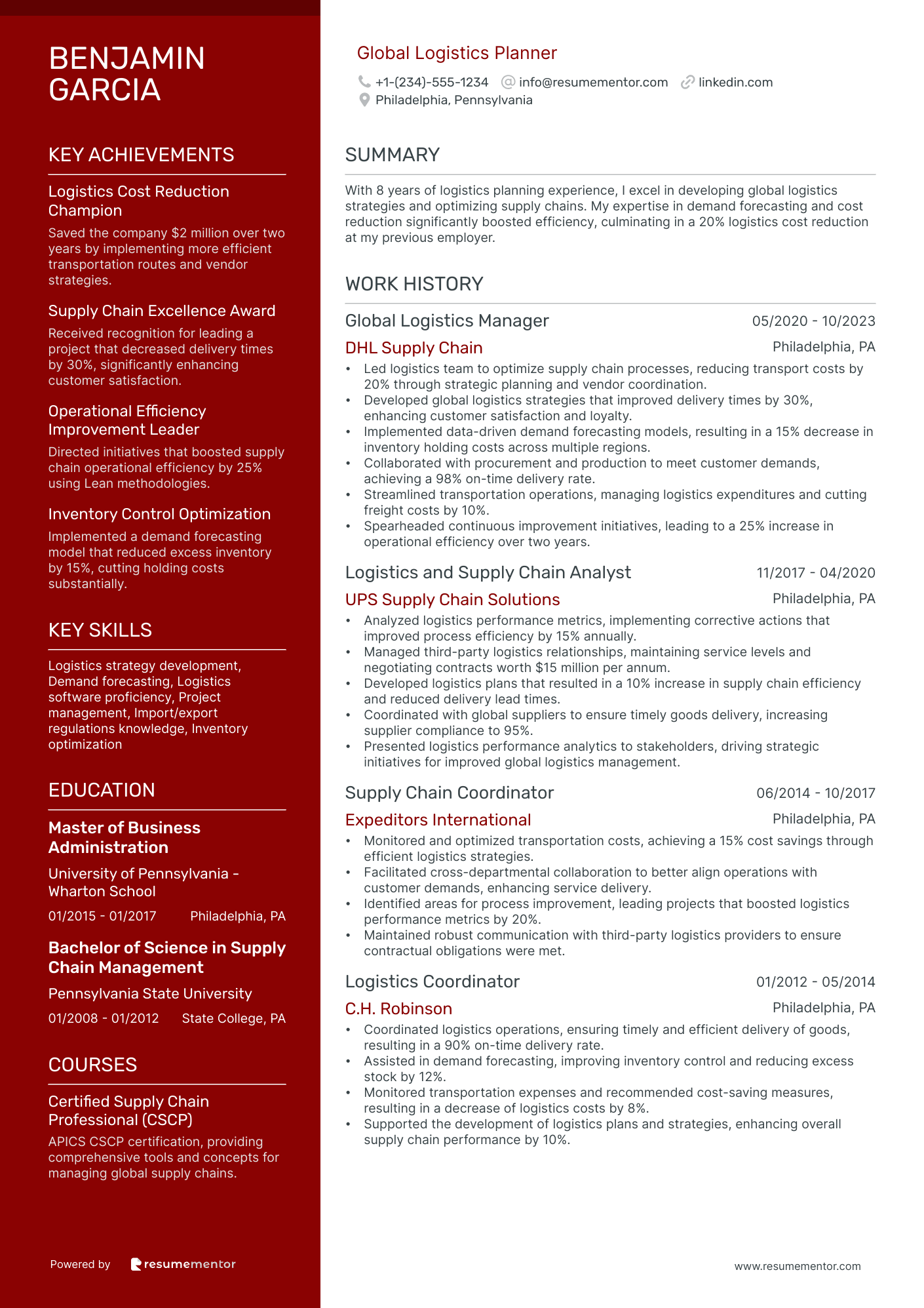
Global Logistics Planner
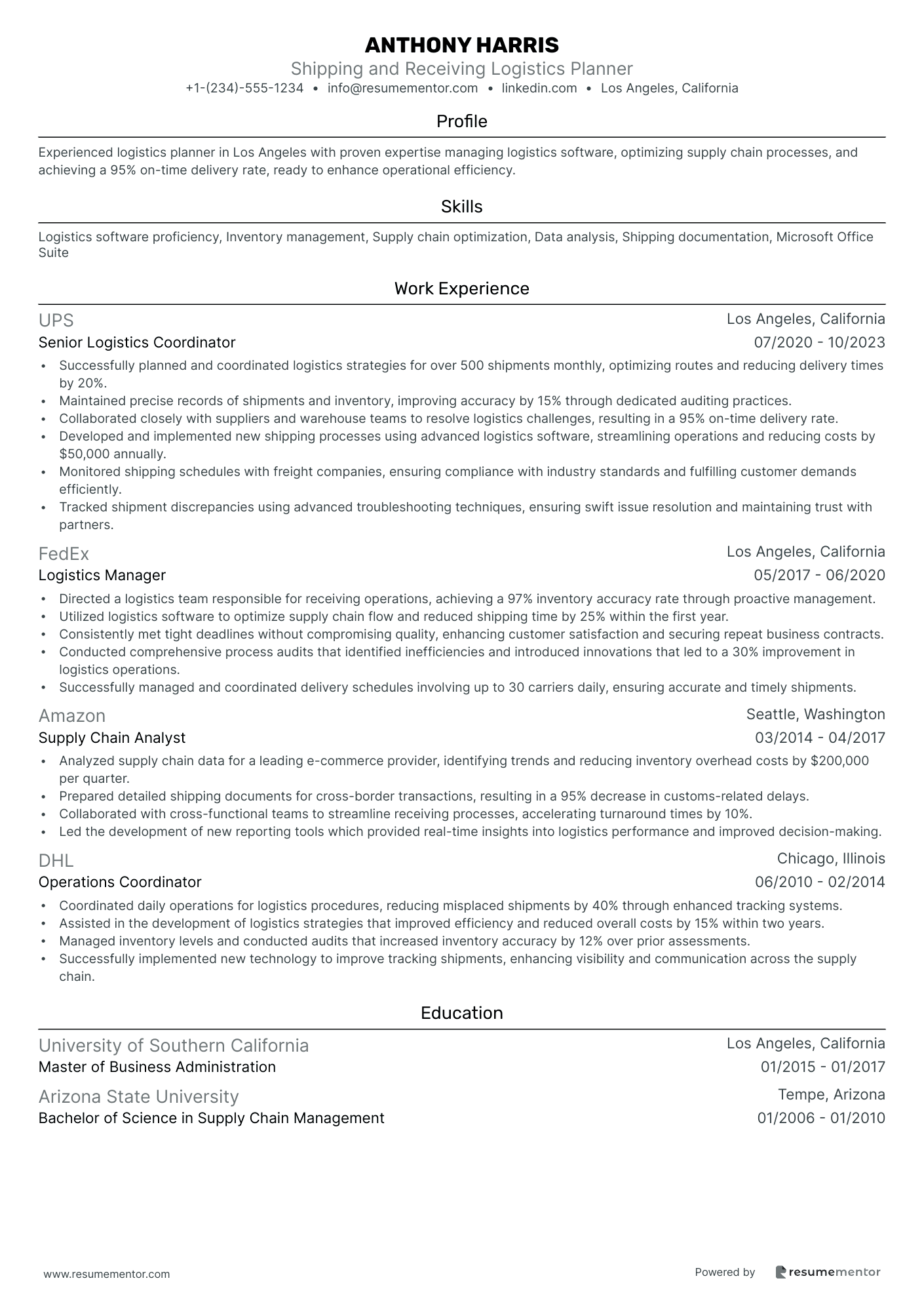
Shipping and Receiving Logistics Planner
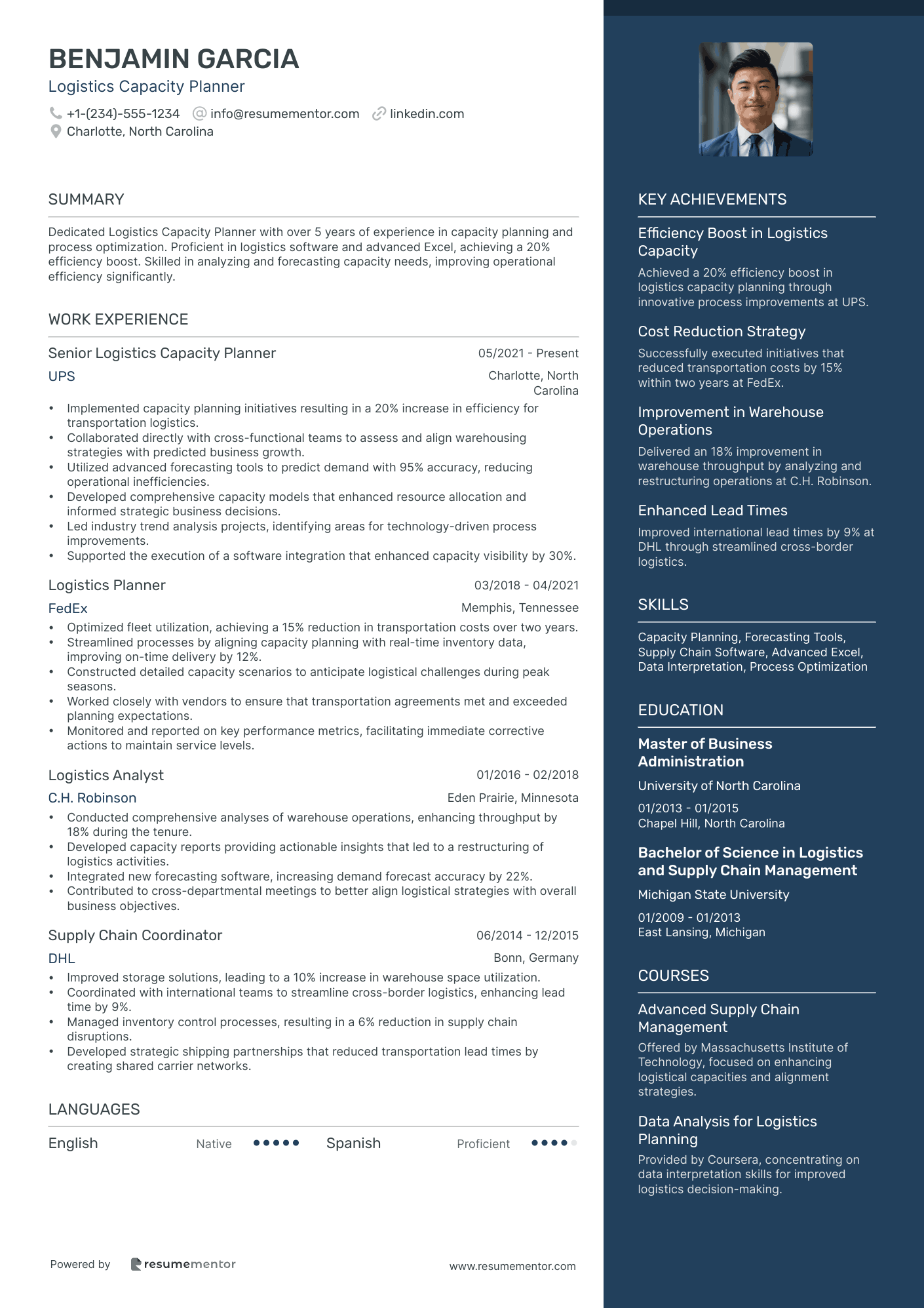
Logistics Capacity Planner
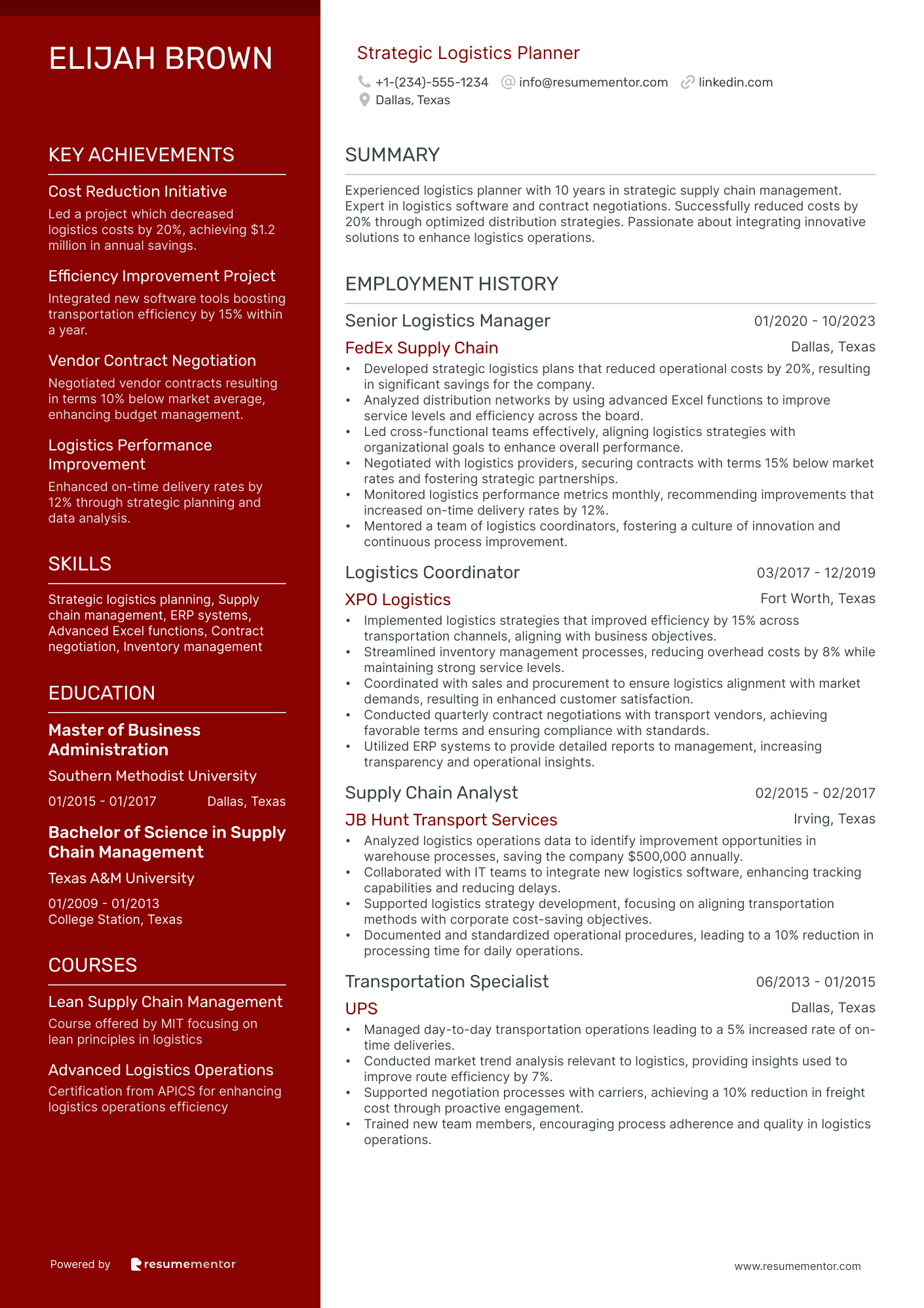
Strategic Logistics Planner
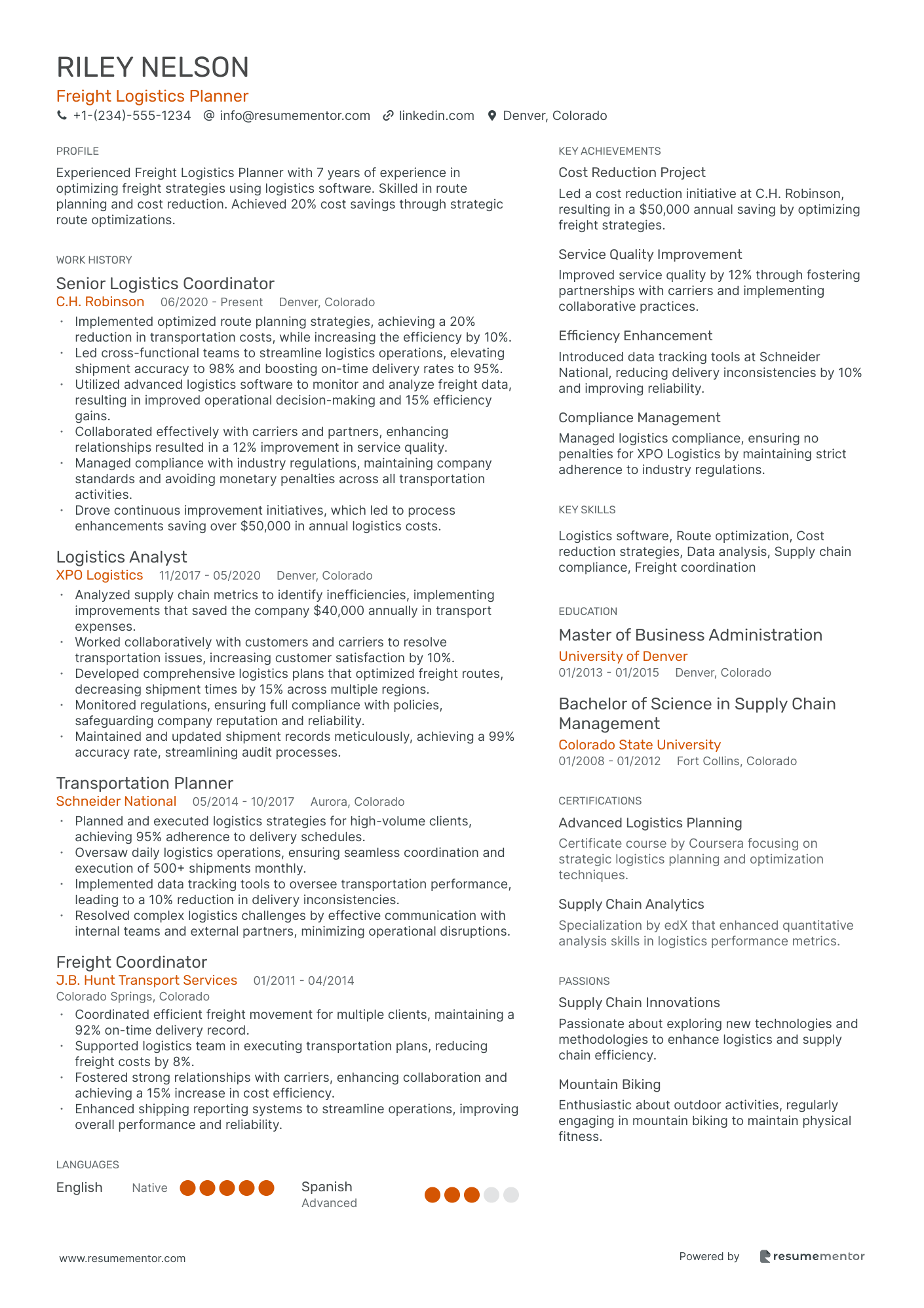
Freight Logistics Planner

Supply Chain Logistics Planner resume sample
- •Developed a data-driven logistics strategy that optimized delivery routes, reducing transportation costs by 20%.
- •Led a cross-functional team to streamline warehouse operations, resulting in a 15% increase in operational efficiency.
- •Coordinated with suppliers and distributors to synchronize inventory levels, decreasing stockouts by 40%.
- •Utilized ERP software to forecast demand, achieving a 95% accuracy rate in inventory predictions.
- •Implemented a comprehensive inventory management system, significantly shortening replenishment cycles.
- •Managed logistics performance metrics and generated detailed reports to boost supplier performance by 25%.
- •Redesigned logistics plans that effectively reduced supply chain costs by 15%, enhancing overall company profitability.
- •Analyzed supply chain operations leading to targeted improvements in process efficiencies by 18%.
- •Acted as the main contact for logistics-related issues, resolving problems swiftly to ensure timely deliveries.
- •Integrated advanced analytics tools for tracking logistics performance, resulting in innovative approaches to efficiency enhancement.
- •Collaborated with procurement to ensure seamless availability of materials, surpassing demand forecasts by 10%.
- •Executed logistics strategies which improved product delivery times by 20%, significantly enhancing customer satisfaction.
- •Managed inventory levels across multiple regional distribution centers, effectively reducing excess stock by 12%.
- •Built strong supplier relationships, ensuring a 100% on-time product delivery rate over a 12-month period.
- •Spearheaded demand forecasting initiatives, achieving industry-leading inventory turnover ratios.
- •Assisted in the implementation of logistics plans that supports a supply chain efficiency increase by 10%.
- •Monitored inventory data to recommend timely replenishment cycles, reducing potential stockouts by 15%.
- •Collaborated with suppliers to improve the supply chain operations, which reduced lead times by 8%.
- •Utilized ERP systems to streamline the logistics operations, optimizing the operations workflow.
Transportation Logistics Planner resume sample
- •Developed optimized transportation routes using TMS, resulting in a 20% reduction in fuel costs and improved delivery times.
- •Collaborated with over 50 carriers to negotiate contracts, achieving a 10% decrease in shipping rates while maintaining service standards.
- •Analyzed delivery data to identify inefficiencies, proposing actionable measures that improved service levels by 25%.
- •Led cross-functional meetings with inventory and production departments, aligning logistics strategies with demand fluctuations.
- •Implemented contingency plans during a major supply chain disruption, minimizing delivery delays by 40% and ensuring customer satisfaction.
- •Prepared monthly logistics performance reports, utilizing data-driven insights to present actionable recommendations to management.
- •Improved carrier performance monitoring procedures, leading to a 15% increase in on-time delivery metrics.
- •Spearheaded a project to integrate a new transportation management system, reducing manual processes by 30%.
- •Collaborated with procurement teams to coordinate inventory levels, avoiding overstock and stockouts by maintaining optimal levels.
- •Designed a KPI dashboard to track transportation efficacy, aiding in strategic decision-making and cost reduction.
- •Developed solutions for recurring logistics challenges, boosting supply chain resilience and reliability by 20%.
- •Managed logistics plans for key clients, streamlining operations and slashing transportation costs by 18% over two years.
- •Worked closely with a team of 12 to enhance inventory management, ensuring seamless manufacturing and distribution support.
- •Performed in-depth analysis of supply chain processes, identifying improvement areas and implementing changes that boosted efficiency by 10%.
- •Negotiated contract terms with service providers, securing agreements that resulted in a 5% cost reduction and elevated service quality.
- •Assisted in the design and roll-out of new logistics processes, enhancing overall supply chain performance by 12%.
- •Supported daily logistics operations and coordinated with team members on special project deliveries and orders.
- •Tracked shipments to ensure timely deliveries, resolving delays promptly and maintaining customer satisfaction.
- •Developed a reporting structure that improved transparency in weekly logistics meetings, enhancing collaboration across departments.
Inventory Logistics Planner resume sample
- •Developed a stock prediction model using sales forecasts and market trends that improved order accuracy by 20%.
- •Led a cross-functional team to identify logistics inefficiencies, resulting in a 15% cost reduction in transportation expenses.
- •Managed inventory levels across six distribution centers, achieving a reduction in stockouts by 25% through strategic planning.
- •Collaborated with suppliers to enhance delivery schedules, decreasing lead time by two days on average for key SKUs.
- •Implemented a new inventory management system, which reduced manual entry errors by 30% over a one-year period.
- •Conducted regular inventory audits, increasing data accuracy and reducing discrepancies by 10%.
- •Optimized warehouse storage solutions, cutting overhead storage costs by $50,000 annually.
- •Reduced excess inventory by 18% through detailed data analysis and process improvement recommendations.
- •Led the seasonal inventory management project, enhancing stock turnover rates by 22% during peak periods.
- •Facilitated communication between marketing and the logistics team to streamline promotional stock handling processes.
- •Trained and mentored 5 new team members, improving team productivity and efficiency by integrating best practices.
- •Collaborated with suppliers to establish more reliable delivery schedules, enhancing product availability by 15%.
- •Utilized SAP for tracking inventory movement, resulting in improved operational efficiency and a 12% labor cost reduction.
- •Initiated inventory reduction strategies that decreased obsolescence by 10% through early identification of trends.
- •Assisted in developing training programs for staff, significantly reducing onboarding time from four weeks to three.
- •Analyzed inventory data to identify excess stock issues, which led to a 7% reduction in spoilage.
- •Participated in process improvements that enhanced delivery accuracy by 8% for a key product line.
- •Assisted in implementing a new logistics tracking system, increasing delivery speed and reducing delayed shipments by 5%.
- •Prepared and maintained inventory reports that guided decisions leading to a 10% increase in order fulfillment rates.
Warehouse Logistics Planner resume sample
- •Oversaw daily operations of a 120,000 sq. ft. warehouse, increasing throughput efficiency by 15% in one year.
- •Implemented real-time inventory tracking system that reduced discrepancies from 8% to 3%, enhancing overall accuracy.
- •Collaborated with procurement and sales teams to optimize stock levels, reducing overstock by 20% through forecasting techniques.
- •Revamped warehouse layout, facilitating a 10% reduction in pick-and-pack times, which improved order processing rates.
- •Led cross-functional meetings to align logistics strategies with business objectives, resulting in a 12% boost in customer satisfaction.
- •Trained 10 warehouse operatives on new logistics procedures and safety standards, leading to an incident-free record for 18 months.
- •Conducted market analysis and inventory forecasting that led to a 30% reduction in holding costs over 12 months.
- •Coordinated with 50+ vendors to ensure timely delivery, achieving a 98% on-time shipment record.
- •Analyzed sales patterns to adjust inventory controls, minimizing stockouts by 15% across multiple units.
- •Streamlined procurement processes through targeted software applications, saving 200 man-hours annually.
- •Produce weekly reports on logistics efficiency that provided actionable insights, improving strategic decision-making.
- •Supervised warehouse tasks, enhancing productivity by introducing lean practices that cut waste by 18%.
- •Managed logistics for a major client project, ensuring strict adherence to timelines, resulting in a 25% project cost saving.
- •Led a team that implemented a warehouse management system which streamlined operations, reducing errors by 40%.
- •Built strong relationships with carriers, improving delivery times by 10% and customer satisfaction rates by 8%.
- •Enhanced inventory monitoring by integrating advanced software tools, leading to a 30% decrease in loss rates.
- •Worked closely with procurement to optimize stock levels, cutting unnecessary inventory costs by $50,000 annually.
- •Developed a comprehensive database to maintain item accuracy, reducing manual intervention by 20%.
- •Achieved a 95% stocking rate accuracy through rigorous data analysis and cross-departmental collaboration.
Production Logistics Planner resume sample
- •Led the improvement of inventory control systems, successfully reducing holding costs by 20% within a single quarter.
- •Collaborated with procurement teams to foresee material requirements, optimizing resource allocation by accurate forecasting.
- •Streamlined communication channels between external transport providers, increasing on-time material delivery rates by 10%.
- •Conducted detailed analysis of production schedules, effectively mitigating disruptions and enhancing schedule adherence.
- •Initiated cross-departmental meetings, leading to a collective 15% increase in supply chain efficiency.
- •Ensured logistics operations compliance with safety and regulations, avoiding any related operational disruptions.
- •Forecasted inventory needs accurately, leading to a 25% improvement in material availability for production schedules.
- •Implemented a logistics strategy that reduced transportation costs by 18%, achieving notable budgetary savings.
- •Managed complex supplier relations, resulting in the development of a reliable, cost-effective supply network.
- •Analyzed logistics performance data, producing actionable insights that enhanced production line efficiency by 12%.
- •Revamped logistics records management, enhancing data accuracy and access by implementing new software integrations.
- •Developed logistics frameworks that supported a 10% reduction in lead times for key product lines.
- •Facilitated cross-functional collaborations, effectively aligning logistics priorities with overall business objectives.
- •Implemented Lean Manufacturing initiatives, leading to process improvements that reduced waste by 5%.
- •Assisted with inventory management systems upgrade, resulting in a significant improvement in demand forecast accuracy.
- •Enhanced production planning processes, contributing to a 15% increase in production throughput.
- •Monitored logistic operations closely, adjusting schedules to maintain production efficiency during supply chain fluctuations.
- •Provided vital production data to management, assisting in strategic decision-making that improved output quality.
- •Coordinated with various departments to ensure smooth supply chain movements, boosting systemic reliability.
Global Logistics Planner resume sample
- •Led logistics team to optimize supply chain processes, reducing transport costs by 20% through strategic planning and vendor coordination.
- •Developed global logistics strategies that improved delivery times by 30%, enhancing customer satisfaction and loyalty.
- •Implemented data-driven demand forecasting models, resulting in a 15% decrease in inventory holding costs across multiple regions.
- •Collaborated with procurement and production to meet customer demands, achieving a 98% on-time delivery rate.
- •Streamlined transportation operations, managing logistics expenditures and cutting freight costs by 10%.
- •Spearheaded continuous improvement initiatives, leading to a 25% increase in operational efficiency over two years.
- •Analyzed logistics performance metrics, implementing corrective actions that improved process efficiency by 15% annually.
- •Managed third-party logistics relationships, maintaining service levels and negotiating contracts worth $15 million per annum.
- •Developed logistics plans that resulted in a 10% increase in supply chain efficiency and reduced delivery lead times.
- •Coordinated with global suppliers to ensure timely goods delivery, increasing supplier compliance to 95%.
- •Presented logistics performance analytics to stakeholders, driving strategic initiatives for improved global logistics management.
- •Monitored and optimized transportation costs, achieving a 15% cost savings through efficient logistics strategies.
- •Facilitated cross-departmental collaboration to better align operations with customer demands, enhancing service delivery.
- •Identified areas for process improvement, leading projects that boosted logistics performance metrics by 20%.
- •Maintained robust communication with third-party logistics providers to ensure contractual obligations were met.
- •Coordinated logistics operations, ensuring timely and efficient delivery of goods, resulting in a 90% on-time delivery rate.
- •Assisted in demand forecasting, improving inventory control and reducing excess stock by 12%.
- •Monitored transportation expenses and recommended cost-saving measures, resulting in a decrease of logistics costs by 8%.
- •Supported the development of logistics plans and strategies, enhancing overall supply chain performance by 10%.
Shipping and Receiving Logistics Planner resume sample
- •Successfully planned and coordinated logistics strategies for over 500 shipments monthly, optimizing routes and reducing delivery times by 20%.
- •Maintained precise records of shipments and inventory, improving accuracy by 15% through dedicated auditing practices.
- •Collaborated closely with suppliers and warehouse teams to resolve logistics challenges, resulting in a 95% on-time delivery rate.
- •Developed and implemented new shipping processes using advanced logistics software, streamlining operations and reducing costs by $50,000 annually.
- •Monitored shipping schedules with freight companies, ensuring compliance with industry standards and fulfilling customer demands efficiently.
- •Tracked shipment discrepancies using advanced troubleshooting techniques, ensuring swift issue resolution and maintaining trust with partners.
- •Directed a logistics team responsible for receiving operations, achieving a 97% inventory accuracy rate through proactive management.
- •Utilized logistics software to optimize supply chain flow and reduced shipping time by 25% within the first year.
- •Consistently met tight deadlines without compromising quality, enhancing customer satisfaction and securing repeat business contracts.
- •Conducted comprehensive process audits that identified inefficiencies and introduced innovations that led to a 30% improvement in logistics operations.
- •Successfully managed and coordinated delivery schedules involving up to 30 carriers daily, ensuring accurate and timely shipments.
- •Analyzed supply chain data for a leading e-commerce provider, identifying trends and reducing inventory overhead costs by $200,000 per quarter.
- •Prepared detailed shipping documents for cross-border transactions, resulting in a 95% decrease in customs-related delays.
- •Collaborated with cross-functional teams to streamline receiving processes, accelerating turnaround times by 10%.
- •Led the development of new reporting tools which provided real-time insights into logistics performance and improved decision-making.
- •Coordinated daily operations for logistics procedures, reducing misplaced shipments by 40% through enhanced tracking systems.
- •Assisted in the development of logistics strategies that improved efficiency and reduced overall costs by 15% within two years.
- •Managed inventory levels and conducted audits that increased inventory accuracy by 12% over prior assessments.
- •Successfully implemented new technology to improve tracking shipments, enhancing visibility and communication across the supply chain.
Logistics Capacity Planner resume sample
- •Implemented capacity planning initiatives resulting in a 20% increase in efficiency for transportation logistics.
- •Collaborated directly with cross-functional teams to assess and align warehousing strategies with predicted business growth.
- •Utilized advanced forecasting tools to predict demand with 95% accuracy, reducing operational inefficiencies.
- •Developed comprehensive capacity models that enhanced resource allocation and informed strategic business decisions.
- •Led industry trend analysis projects, identifying areas for technology-driven process improvements.
- •Supported the execution of a software integration that enhanced capacity visibility by 30%.
- •Optimized fleet utilization, achieving a 15% reduction in transportation costs over two years.
- •Streamlined processes by aligning capacity planning with real-time inventory data, improving on-time delivery by 12%.
- •Constructed detailed capacity scenarios to anticipate logistical challenges during peak seasons.
- •Worked closely with vendors to ensure that transportation agreements met and exceeded planning expectations.
- •Monitored and reported on key performance metrics, facilitating immediate corrective actions to maintain service levels.
- •Conducted comprehensive analyses of warehouse operations, enhancing throughput by 18% during the tenure.
- •Developed capacity reports providing actionable insights that led to a restructuring of logistics activities.
- •Integrated new forecasting software, increasing demand forecast accuracy by 22%.
- •Contributed to cross-departmental meetings to better align logistical strategies with overall business objectives.
- •Improved storage solutions, leading to a 10% increase in warehouse space utilization.
- •Coordinated with international teams to streamline cross-border logistics, enhancing lead time by 9%.
- •Managed inventory control processes, resulting in a 6% reduction in supply chain disruptions.
- •Developed strategic shipping partnerships that reduced transportation lead times by creating shared carrier networks.
Strategic Logistics Planner resume sample
- •Developed strategic logistics plans that reduced operational costs by 20%, resulting in significant savings for the company.
- •Analyzed distribution networks by using advanced Excel functions to improve service levels and efficiency across the board.
- •Led cross-functional teams effectively, aligning logistics strategies with organizational goals to enhance overall performance.
- •Negotiated with logistics providers, securing contracts with terms 15% below market rates and fostering strategic partnerships.
- •Monitored logistics performance metrics monthly, recommending improvements that increased on-time delivery rates by 12%.
- •Mentored a team of logistics coordinators, fostering a culture of innovation and continuous process improvement.
- •Implemented logistics strategies that improved efficiency by 15% across transportation channels, aligning with business objectives.
- •Streamlined inventory management processes, reducing overhead costs by 8% while maintaining strong service levels.
- •Coordinated with sales and procurement to ensure logistics alignment with market demands, resulting in enhanced customer satisfaction.
- •Conducted quarterly contract negotiations with transport vendors, achieving favorable terms and ensuring compliance with standards.
- •Utilized ERP systems to provide detailed reports to management, increasing transparency and operational insights.
- •Analyzed logistics operations data to identify improvement opportunities in warehouse processes, saving the company $500,000 annually.
- •Collaborated with IT teams to integrate new logistics software, enhancing tracking capabilities and reducing delays.
- •Supported logistics strategy development, focusing on aligning transportation methods with corporate cost-saving objectives.
- •Documented and standardized operational procedures, leading to a 10% reduction in processing time for daily operations.
- •Managed day-to-day transportation operations leading to a 5% increased rate of on-time deliveries.
- •Conducted market trend analysis relevant to logistics, providing insights used to improve route efficiency by 7%.
- •Supported negotiation processes with carriers, achieving a 10% reduction in freight cost through proactive engagement.
- •Trained new team members, encouraging process adherence and quality in logistics operations.
Freight Logistics Planner resume sample
- •Implemented optimized route planning strategies, achieving a 20% reduction in transportation costs, while increasing the efficiency by 10%.
- •Led cross-functional teams to streamline logistics operations, elevating shipment accuracy to 98% and boosting on-time delivery rates to 95%.
- •Utilized advanced logistics software to monitor and analyze freight data, resulting in improved operational decision-making and 15% efficiency gains.
- •Collaborated effectively with carriers and partners, enhancing relationships resulted in a 12% improvement in service quality.
- •Managed compliance with industry regulations, maintaining company standards and avoiding monetary penalties across all transportation activities.
- •Drove continuous improvement initiatives, which led to process enhancements saving over $50,000 in annual logistics costs.
- •Analyzed supply chain metrics to identify inefficiencies, implementing improvements that saved the company $40,000 annually in transport expenses.
- •Worked collaboratively with customers and carriers to resolve transportation issues, increasing customer satisfaction by 10%.
- •Developed comprehensive logistics plans that optimized freight routes, decreasing shipment times by 15% across multiple regions.
- •Monitored regulations, ensuring full compliance with policies, safeguarding company reputation and reliability.
- •Maintained and updated shipment records meticulously, achieving a 99% accuracy rate, streamlining audit processes.
- •Planned and executed logistics strategies for high-volume clients, achieving 95% adherence to delivery schedules.
- •Oversaw daily logistics operations, ensuring seamless coordination and execution of 500+ shipments monthly.
- •Implemented data tracking tools to oversee transportation performance, leading to a 10% reduction in delivery inconsistencies.
- •Resolved complex logistics challenges by effective communication with internal teams and external partners, minimizing operational disruptions.
- •Coordinated efficient freight movement for multiple clients, maintaining a 92% on-time delivery record.
- •Supported logistics team in executing transportation plans, reducing freight costs by 8%.
- •Fostered strong relationships with carriers, enhancing collaboration and achieving a 15% increase in cost efficiency.
- •Enhanced shipping reporting systems to streamline operations, improving overall performance and reliability.
Navigating the logistics landscape is complex, and crafting your resume shouldn’t add to the challenge. You handle intricate schedules, coordinate shipments, and make sure everything runs like clockwork. Articulating this technical expertise on paper can feel overwhelming, but it doesn't have to be.
Your resume acts as a bridge, connecting your current role to your future goals. A well-designed resume template can simplify this process, shining a spotlight on your skills, experience, and achievements. Explore these resume templates to transform a blank page into a career roadmap.
With a template, you gain a head start, shaping your story in an organized way without reinventing the wheel. This framework helps you align your unique career journey with the roles you aspire to. As you begin writing, envision your resume as a map, guiding employers to understand your strengths. When you tailor your experience to meet the role you’re aiming for, you’re steering your career effectively. Your resume is your first step toward new opportunities, making it essential to present your capabilities with clarity.
Key Takeaways
- Crafting a logistics planner resume effectively involves highlighting organizational skills, illustrating experience in supply chain management, and showcasing problem-solving abilities.
- A reverse-chronological format is recommended to present recent work experiences first, which is essential in a logistics role where current skills are highly valued.
- Including hard skills such as inventory management and logistics coordination, as well as soft skills like communication and teamwork, enhances the resume's appeal.
- The education section should focus on degrees pertinent to logistics and supply chain management, while including certifications can further underscore expertise.
- Incorporating extra sections like languages, hobbies, volunteer work, and books read can provide a comprehensive snapshot of your skills and personal growth in the field.
What to focus on when writing your logistics planner resume
A logistics planner resume should effectively communicate your organizational skills and supply chain expertise to the recruiter—your resume serves as a strategic tool that highlights your ability to optimize transportation, improve efficiency, and manage resources. It's crucial to thoroughly illustrate your experience in planning and coordinating supply chains while showcasing your problem-solving skills.
How to structure your logistics planner resume
- Contact Information: Start with your full name, phone number, and email address, ensuring it's up-to-date and presented professionally—this allows recruiters to quickly get in touch with you, bridging the first connection. If relevant, include a LinkedIn profile URL for additional insights into your professional background.
- Professional Summary: Deliver a compelling brief that encapsulates your logistics planning skills and the value you bring to potential employers—a well-crafted summary introduces your experience and sets the tone for the resume, emphasizing why you are the right fit.
- Work Experience: Detail your previous roles in logistics planning, focusing not just on responsibilities but on quantified achievements like reducing delivery times or optimizing supply chain efficiency—this highlights your impact and competence in handling challenges effectively.
- Skills: List targeted skills such as inventory management, supply chain optimization, and specific logistics software—you demonstrate your readiness and expertise in areas crucial for a logistics planner role, aligning with job requirements.
- Education: Highlight your educational background by mentioning relevant degree(s) in logistics or supply chain management, alongside certifications like Certified Supply Chain Professional (CSCP)—this underlines your foundational knowledge and commitment to professional growth.
- Technical Proficiency: Showcase your experience with specialized software like SAP, Oracle, or freight management systems—this section is essential to convey your capability to utilize industry tools effectively, crucial for the logistics planning role.
Finally, as we transition into resume format, remember that an organized structure supports clarity; below we'll dive deeper into each section to guide you in crafting a standout logistics planner resume.
Which resume format to choose
Creating a logistics planner resume involves ensuring it's clear, organized, and effectively highlights your skills. In your industry, a reverse-chronological format is most effective. This layout places your most recent job experience up front, which is crucial in logistics where current skills and achievements are highly valued. It ensures that employers quickly see the most relevant and impactful parts of your work history.
Selecting the right font enhances your resume’s professional look without distracting from your content. Opt for Rubik or Lato for their clean lines and straightforward readability, qualities that mirror the precision needed in logistics. Montserrat also offers a modern feel, tying in your innovative skills with a touch of style. These choices move beyond the generic feel of Arial or Times New Roman, bringing a contemporary edge to your resume while maintaining clarity.
Saving your resume as a PDF is vital. This format preserves your document’s layout across all platforms, ensuring that potential employers see your resume exactly as you intended. In logistics, where detail is key, this reliability can make a strong impression.
Finally, having one-inch margins around your document creates a balanced and open layout. This space not only improves readability but also gives your resume a neat and organized appearance. Keeping your format clean and professional supports the structured nature of logistics planning, helping to present your qualifications in the best possible light.
How to write a quantifiable resume experience section
For your logistics planner resume's experience section, emphasize how your work has brought tangible benefits to past employers. This section highlights your contributions with structured bullet points that draw attention to your impact. Start with your most recent job and go backward, typically covering the last 10-15 years. Tailor your resume for each job application by focusing on roles and tasks that align closely with the specific position you're aiming for. Using strong action words like "optimized" and "streamlined" can effectively convey your responsibilities. Emphasize achievements that are quantifiable, such as cutting costs or enhancing delivery efficiency.
- •Reduced freight costs by 15% through strategic route planning and vendor negotiation.
- •Improved delivery times by 20% by analyzing and optimizing warehouse processes.
- •Coordinated logistics for a project that saved $200K annually in operating expenses.
- •Implemented a new tracking system, increasing shipment transparency and customer satisfaction by 25%.
Your experience section makes a strong impression by linking your past actions to real benefits for former employers. Each bullet is crafted to demonstrate your effectiveness, using numbers to clearly showcase your achievements. By detailing how you successfully reduced costs or improved delivery timelines, you present undeniable evidence of your skills. This approach speaks to companies seeking substantial impact from potential hires. The use of action-driven language also keeps your narrative engaging, highlighting your proactive contributions. With the clear chronology and relevant details, your experience aligns perfectly with logistics planning requirements, creating a seamless fit with job expectations.
Problem-Solving Focused resume experience section
A problem-solving-focused logistics planner resume experience section should clearly demonstrate how your expertise turned challenges into successes. Begin by identifying key issues you encountered and detail the innovative solutions you implemented to overcome them. It's important to quantify your achievements with concrete metrics, such as time saved or costs reduced, to emphasize your impact. Describe your strategic approach and collaborative efforts, highlighting both your analytical skills and team contributions to solving complex logistical problems.
Next, organize your experiences methodically. Start with the duration of your role, followed by your job title and the company name. Use bullet points to detail specific accomplishments, with each point focusing on a problem you effectively addressed. This approach allows potential employers to quickly recognize your ability to enhance operations through your problem-solving skills. By illustrating your success in tackling logistical challenges, optimizing processes, and implementing effective strategies, you can clearly convey the value you bring to any organization.
Logistics Planner
Green Transport Solutions
June 2019 - April 2022
- Led a team to develop a new route-planning system that reduced delivery times by 20%.
- Introduced an inventory management tool that cut warehousing costs by 15% annually.
- Coordinated with suppliers to resolve a critical bottleneck, boosting supply chain efficiency by 30%.
- Optimized fleet maintenance schedules, improving vehicle availability by 25%.
Industry-Specific Focus resume experience section
A logistics-focused resume experience section should effectively showcase your expertise and achievements in the field. Start by clearly identifying your job title and the company where you worked, along with the dates of your employment, to provide context. Focus on your core responsibilities, such as managing inventory, coordinating supply chains, and planning transportation. Each bullet point should flow logically to highlight different facets of your role, illustrating how you positively impacted the company’s operations.
For instance, you can describe optimizing delivery routes to reduce transportation costs and how that led to establishing strategic partnerships with carriers. Then, smoothly transition to explaining how you boosted inventory accuracy by synchronizing activities across multiple warehouses. Follow with how these improvements sped up order fulfillment through a newly implemented inventory management system. Finally, show how your collaboration with suppliers dramatically improved supply chain efficiency. This cohesive narrative will clearly convey your logistics planning expertise to potential employers.
Logistics Planner
LogisticsPro Solutions
June 2020 - Present
- Cut transportation costs by 15% through smarter route planning and partnerships with carriers.
- Boosted inventory accuracy by 20% by syncing supply chain activities across three regional warehouses.
- Sped up order fulfillment by 25% with a new inventory management system.
- Teamed up with suppliers to slash lead times by 30%, making the supply chain more efficient overall.
Achievement-Focused resume experience section
A logistics-focused resume experience section should emphasize your ability to make impactful contributions in your role. Start by listing your job title and the organization you worked for, immediately setting the context. Highlight your accomplishments by using numbers that demonstrate the success of your efforts, whether it be cost savings, improved efficiencies, or enhanced delivery timelines. Then, weave in details about the challenges you faced, the actions you took, and the positive results that followed, all painting a clear picture of your capability and the value you bring.
To effectively showcase these experiences, break them down into bullet points that start with strong action verbs. Each bullet should be a snapshot of a key achievement, focusing on the benefits like reduced costs or improved logistics efficiency. Keep your language straightforward and cohesive, ensuring your resume stands out by seamlessly connecting your accomplishments and expertise.
Logistics Planner
Global Logistics Solutions
Jan 2020 - Dec 2022
- Reduced shipping costs by 15% through route optimization and vendor negotiations.
- Improved delivery times by 20% by implementing advanced tracking systems.
- Coordinated logistics for international shipments, ensuring compliance with regulations.
- Led a team of 5 to successfully execute a warehouse relocation, minimizing downtime.
Technology-Focused resume experience section
A technology-focused logistics planner resume experience section should clearly demonstrate the integral role technology plays in your work. Start by reflecting on the key tools you've used, like supply chain management software or inventory tracking systems, and explain how they have enhanced your logistics processes. Consider situations where these technologies helped improve efficiency or reduce costs, using concrete results to highlight your impact. This gives potential employers a clear picture of your technical skills and achievements.
Delve into your role by illustrating how you collaborate with teams and solve problems creatively, while also showing your ability to adapt to new technologies. Share specific examples of successful integrations or technological improvements you have spearheaded. Each bullet point should cohesively reflect your accomplishments and expertise, matching your job title and career level.
Logistics Planner
Efficient Transport
March 2020 - Present
- Implemented a new warehouse management system, boosting inventory accuracy by 25%.
- Optimized supply chain processes with advanced software, cutting delivery times by 15%.
- Guided a team of 10 through new logistics technology, leading to better efficiency.
- Used data analytics tools to streamline operations, saving $50K annually.
Write your logistics planner resume summary section
A results-focused logistics planner resume summary should effectively showcase your expertise and strengths. Begin by highlighting your experience in supply chain management and operational efficiency, connecting your skills to real-world outcomes. Your summary should tell a story about how you resolve supply chain issues and enhance delivery processes, painting you as a strategic thinker who can optimize logistics operations. Emphasize your organizational skills, which are crucial in a logistics role, to round out your profile.
A compelling summary might read like this:
This example is effective because it weaves together your experience, skills, and achievements in a clear, concise manner. By emphasizing practical skills like improving supply chain efficiency, you make yourself an attractive candidate to employers.
Understanding the distinctions between a resume summary and other similar sections is crucial. A resume objective is usually focused on your career aspirations, making it more suitable for those new to the workforce. A resume summary, on the other hand, highlights your past achievements and skills, and is ideal for more experienced candidates. Meanwhile, a resume profile offers an outline of your experience and skills, while a summary of qualifications lists specific accomplishments. Clearly presenting your strengths helps hook an employer’s attention quickly, ensuring your resume stands out.
Listing your logistics planner skills on your resume
A logistics-focused resume should effectively showcase your skills and strengths, setting you apart in the job market. Creating a skills section can be a strategic move, whether it stands alone or is blended into other sections like experience or summary. By highlighting your strengths and soft skills, you offer a glimpse into your personal attributes, such as teamwork and communication, which demonstrate how you excel in your role. Hard skills, in contrast, are your technical abilities specific to logistics, such as proficiency in supply chain software or data analysis.
These skills, both hard and soft, serve as vital resume keywords that catch the attention of hiring managers and applicant tracking systems. They highlight your competencies, ensuring your resume stands out. Here’s how you could structure a standalone skills section in JSON format:
This skills section is effective because it is concise yet comprehensive, listing essential skills key to a logistics planner role. By focusing on these competencies, you enhance the appeal of your resume.
Best hard skills to feature on your logistics planner resume
To stand out, a logistics planner's hard skills should convey expertise in logistics operations and strategic decision-making. These skills are crucial as they demonstrate your ability to streamline processes and manage supply chains effectively.
Hard Skills
- Supply Chain Management
- Logistics Coordination
- Inventory Management
- Data Analysis
- Warehouse Management Systems
- Order Processing
- Transportation Management
- Microsoft Excel
- Forecasting and Planning
- ERP Systems
- Vendor Management
- Budget Management
- Lean Manufacturing
- Procurement Processes
- Risk Management
Best soft skills to feature on your logistics planner resume
In addition to technical skills, showcasing soft skills is crucial for a logistics planner. They highlight your ability to collaborate, resolve conflicts, and communicate effectively, all of which are essential in a dynamic work environment.
Soft Skills
- Communication
- Teamwork
- Problem-Solving
- Critical Thinking
- Time Management
- Adaptability
- Attention to Detail
- Leadership
- Negotiation
- Decision-Making
- Organizational Skills
- Stress Management
- Customer Service Orientation
- Conflict Resolution
- Multi-tasking
How to include your education on your resume
An education section is an important part of your resume, especially if you're applying for a logistics planner role. It should highlight relevant studies that align with the specific requirements of the job. Focus on courses, degrees, or certifications related to logistics, supply chain management, or business. Exclude any unrelated education to keep your resume focused and impactful. When listing a degree, mention the name of the degree, the institution, and the date of graduation. If you have a high GPA, it can strengthen your application; simply add it after the degree details, like "GPA: 3.8/4.0." If you graduated with honors such as cum laude, include it with the degree title to showcase your academic achievements.
Incorrect Example:
Correct Example:
The second example is effective because it presents education relevant to a logistics planner position. It emphasizes a degree directly related to the field, includes academic honors to highlight excellence, and features a strong GPA. Only essential details are shown, making it clear and concise for employers.
How to include logistics planner certificates on your resume
Including a certificates section on your logistics planner resume is essential. This section can showcase your qualifications and set you apart from other candidates. Certificates can also be placed in the resume header to draw immediate attention. You can list it as: "Certified Logistics Manager (CLM) | July 2021 | American Production and Inventory Control Society (APICS)".
Start by listing the name of each certificate. Include the date you received it to show your commitment to keeping your skills up-to-date. Add the issuing organization to validate the certificate's credibility. Always prioritize the most relevant certificates for a logistics planner position. Thoughtfully organizing this information will highlight your expertise and dedication.
Here is a good example:
This example is effective because it includes certificates directly relevant to logistics, enhancing the resume's impact. It shows a dedication to quality and efficiency, important in logistics. The clear format makes it easy for employers to find and assess your qualifications.
Extra sections to include on your logistics planner resume
Crafting a standout logistics planner resume involves more than listing your work experience and education. Including relevant and unique sections can greatly enhance your resume by showcasing a well-rounded character and diverse skill set. Here’s how to effectively incorporate various sections.
Language section — Highlight any additional languages you speak to show your ability to communicate in multicultural settings, essential for global logistics. This can improve your chances with employers who operate in diverse regions.
Hobbies and interests section — Share personal interests that build valuable skills like problem-solving or teamwork. This gives potential employers insight into your personality and how you fit within their team.
Volunteer work section — Include volunteer experiences to demonstrate strong community engagement and leadership skills. This section shows employers that you go beyond professional requirements to make a difference.
Books section — List influential books you’ve read that relate to logistics or personal development, indicating a commitment to growth. Employers will see you as someone who values learning and staying informed in your field.
These sections enrich your resume, offering a glimpse into your character and eagerness to excel in logistics planning. They can set you apart by painting a fuller picture of who you are, both professionally and personally.
In Conclusion
In conclusion, crafting a logistics planner resume is not just about listing your past jobs and education; it's about presenting a comprehensive profile that aligns with the demands of the logistics industry. Your resume serves as a vital tool to bridge your current experiences with future opportunities, showcasing your organizational skills, technical proficiencies, and problem-solving capabilities. By using a structured template, you can effectively highlight your unique career journey. Remember, a reverse-chronological format helps employers quickly see your most recent accomplishments, ensuring they grasp the most relevant aspects of your work history.
Choosing the right elements to feature, such as a compelling professional summary, quantified achievements in your experience section, and well-selected skills, can significantly enhance your resume. Tailoring these sections to include specific logistics competencies, like supply chain management and inventory control, demonstrates your readiness for the role you aspire to. Additionally, including certifications and education relevant to logistics reinforces your commitment to professional growth and development.
Don’t forget to include extra sections that offer a glimpse into your character, such as language skills, volunteer work, or books that inspire you. These can show potential employers a more personal side and your dedication to continuous learning. Finally, your resume should always present your qualifications clearly and concisely, formatted in a way that reflects the precise and structured nature of logistics work. If done well, your resume will stand out, guiding you toward your next career milestone in logistics planning.
Related Articles

Continue Reading
Check more recommended readings to get the job of your dreams.
Resume
Resources
Tools
© 2026. All rights reserved.
Made with love by people who care.

